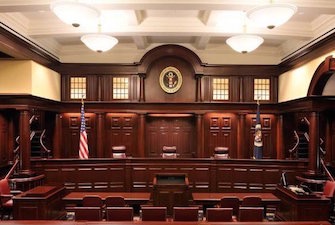“We conclude that Congress’s affirmative grant of an exclusive, direct-review procedure for final written decision deprives the district court of jurisdiction to hear Personal Audio’s collateral attack on the final written decision in this case.” -Federal Circuit decision
 Last Friday, the Federal Circuit affirmed a district court decision that found for the CBS Corporation in its defense against infringement and invalidity as to three claims of U.S. Patent No. 8,112,504 owned by Personal Audio, LLC. While the jury initially found for Personal Audio, the Patent Trial and Appeal Board (PTAB) later invalidated the ‘504 patent and the district court ultimately entered final judgment for CBS.
Last Friday, the Federal Circuit affirmed a district court decision that found for the CBS Corporation in its defense against infringement and invalidity as to three claims of U.S. Patent No. 8,112,504 owned by Personal Audio, LLC. While the jury initially found for Personal Audio, the Patent Trial and Appeal Board (PTAB) later invalidated the ‘504 patent and the district court ultimately entered final judgment for CBS.
The ‘504 patent describes a system for organizing audio files, “by subject matter, into ‘program segments.’ The patent utilizes a “session schedule,” which allows a user to navigate through the schedule by skipping the remainder of a segment, restarting a segment, listening to bookmarked “highlight passages,” or switching over to a “cross-referenced position” in another segment.
Personal Audio sued CBS in 2013, alleging infringement of the ‘504 patent. Later, the Electronic Frontier Foundation petitioned for inter partes review (IPR) of claims 31-35 of the ‘504 patent under 35 U.S.C. §§ 311-319. While the PTAB instituted a review, the district court case still proceeded to trial. The PTAB limited the infringement and invalidity case to claims 31-34. A jury found that CBS had infringed on the claims and awarded Personal Audio $1.3 million in damages. Personal Audio and CBS agreed to stay proceedings in the district court case pending the PTAB’s decision.
The Board later issued a final decision on the IPR concluding that claims 31-35 were unpatentable under 35 U.S.C. § 318(a). Personal Audio initially sought rehearing of the Board’s decision, making two arguments that were relevant to the appeal. First, it argued that the PTAB violated the Seventh Amendment by reexamining the jury findings. Secondly, it argued “that the final written decision was unlawful because the inter partes review scheme violates the Due Process Clause of the Fifth Amendment.” When the PTAB denied rehearing, Personal Audio appealed to the Federal Circuit.
On August 7, 2017, the Federal Circuit affirmed the PTAB’s final written decision and Personal Audio petitioned the Supreme Court for a writ of certiorari, which was denied. The district court later requested a joint status report from Personal Audio and CBS. In the report, Personal Audio reiterated that it “continue[d] to believe that overturning the verdict of the jury with a later IPR proceeding violates the Seventh Amendment of the Constitution” and that “the outcome of the IPR should not be given collateral estoppel effect, since it was filed by a third party under a different standard.” Personal Audio also conceded that the current authority supported judgment in favor of the defendant, CBS.
Personal Audio Challenges on Constitutional Grounds
Personal Audio did not challenge the IPR scheme or any provision or regulation of the scheme. It instead alleged injury from the PTAB’s final written decision regarding unpatentability of claims 31-35 of its ‘504 patent. Personal Audio presented two types of challenges involving the PTAB decision, invoking four constitutional bases and one non-constitutional basis. Personal Audio first challenged the lawfulness of the PTAB’s final written decision itself. Secondly, it challenged the district court’s ruling on the consequence of affirming the Board decision. Specifically, Personal Audio challenged the termination of patent claims in a still-live patent case, which led to a decision for CBS even though the jury rendered a verdict in Personal Audio’s favor.
The Federal Circuit was unable to hear the first type of challenge because Personal Audio did not bring a direct appeal of the final written decision of the PTAB. The CAFC also stated that Personal Audio “forfeited any argument that existing precedent allow[ed] this panel to do anything but reject them.” The Court therefore was required to affirm the district court’s judgment for CBS.
Personal Audio initially brought forth multiple constitutional claims, asserting that the PTAB violated them by issuing its final written decision; all of these claims were forfeited except for the contention that the PTAB violated the Reexamination Clause of the Seventh Amendment because the other grounds were not raised in district court.
The Seventh Amendment challenge to the Board decision failed because the district court did not have jurisdiction, under Article III, to consider the legality of the Board’s decision. Also, from 35 U.S.C. § 141(c), a “party to an inter partes review . . . who is dissatisfied with the final written decision of the [Board] under section 318(a) . . . may appeal the Board’s decision only to the United States Court of Appeals for the Federal Circuit[,]” not to the district court.
Lastly, the challenge failed because Congress had given “exclusive jurisdiction” to the Federal Circuit to hear “an appeal from a decision of … the [Board] with respect to a[n] … inter partes review under title 35.” 28 U.S.C. § 1295(a)(4)(A). Under these provisions, judicial review of the lawfulness of the PTAB’s decision was limited to the CAFC. The Federal Circuit concluded that “Congress’s affirmative grant of an exclusive, direct-review procedure for final written decision deprives the district court of jurisdiction to hear Personal Audio’s collateral attack on the final written decision in this case.”
Personal Audio Challenges the Application of the Final Decision
Personal Audio also argued that the district court erred in deciding in favor of CBS after the PTAB’s affirmed final written decision. It challenged the application of the affirmed decision, not the final written decision itself. This challenge was not “jurisdictionally foreclosed” to the district court, like the previous issue. Personal Audio, however, forfeited this argument when it submitted its status report to the district court because it did not distinguish this case from the other presented cases, said the CAFC. To the contrary, in the joint status report it conceded that “current authority supports rendering a judgment in favor of the Defendant CBS” and that “there is no current precedent for doing otherwise at this time.” Because of this, the Federal Circuit lacked authority to reconsider the precedent that Personal Audio agreed was adverse and controlling; only the en banc court could reconsider the precedent within the Federal Circuit. The CAFC thusly affirmed the district court’s judgment.

![[IPWatchdog Logo]](https://ipwatchdog.com/wp-content/themes/IPWatchdog%20-%202023/assets/images/temp/logo-small@2x.png)

![[[Advertisement]]](https://ipwatchdog.com/wp-content/uploads/2024/04/Patent-Litigation-2024-banner-938x313-1.jpeg)
![[Advertisement]](https://ipwatchdog.com/wp-content/uploads/2024/04/UnitedLex-May-2-2024-sidebar-700x500-1.jpg)
![[Advertisement]](https://ipwatchdog.com/wp-content/uploads/2024/04/Artificial-Intelligence-2024-REPLAY-sidebar-700x500-corrected.jpg)
![[Advertisement]](https://ipwatchdog.com/wp-content/uploads/2024/04/Patent-Litigation-Masters-2024-sidebar-700x500-1.jpg)

![[Advertisement]](https://ipwatchdog.com/wp-content/uploads/2021/12/WEBINAR-336-x-280-px.png)
![[Advertisement]](https://ipwatchdog.com/wp-content/uploads/2021/12/2021-Patent-Practice-on-Demand-recorded-Feb-2021-336-x-280.jpg)
![[Advertisement]](https://ipwatchdog.com/wp-content/uploads/2021/12/Ad-4-The-Invent-Patent-System™.png)






Join the Discussion
3 comments so far.
angry dude
January 19, 2020 05:17 pmAll US (tech) patents are dead – bad ones and good ones too
At this point there is no point spending time here analyzing validity of any US (tech) patent – wtf cares ?
To the morgue then… (oh.. not yet, those senile congress critters need new medications so they still have to figure out how to legally split big pharma patents from tech patents as big pharma won’t last a week without strong US patent protection)
For the rest of us… to the morgue !
TFCFM
January 16, 2020 11:14 amI don’t understand how the decision could possibly have been otherwise.
A jury held a patent infringed (and possibly — the post doesn’t say — also not-proved-invalid). While the verdict was stayed, the PTAB held the patent invalid, and appeals were exhausted without overturning the verdict of invalidity.
Given these facts (am I misunderstanding them?), how could the district court possibly hold for the plaintiff?
Am I missing something that makes this case a closer call?
Daniel Hanson
January 16, 2020 11:09 am“[I]f you want to challenge an action of the United States Patent and Trademark Office (USPTO) on constitutional grounds, you can and ought to raise those challenges before the agency; and you should not expect to be able to bypass the agency and go straight to court.”
https://ipwatchdog.com/2019/03/05/elgin-scotus-preserving-constitutional-issues-uspto/id=106998/
Personal Audio did not do that.
Personal Audio tried to assert a Seventh Amendment challenge to a PTAB decision in a district court proceeding, instead of before the agency. The Federal Circuit had this to say: “As described above, Personal Audio took such an appeal [from the agency’s decision], and there is no basis for any conclusion that the opportunity provided in that appeal was inadequate for the assertion and adjudication of any properly preserved challenge to the final written decision as unlawful.”